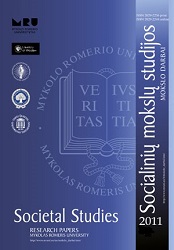Autorių ir gretutinių teisių kolektyvinio administravimo teritorinių ribojimų perspektyvos Europos Sąjungoje
Perspectives of Territorial Restrictions on Collective Management of Copyright and Related Rights in the European Union
Author(s): Ąžuolas ČekanavičiusSubject(s): Supranational / Global Economy, Management and complex organizations, EU-Legislation
Published by: Mykolas Romeris University
Keywords: copyright law; copyright; related rights; collective management;
Summary/Abstract: The current international system of collective management of copyright and related rights is based on reciprocal agreements concluded between collective management organizations (CMOs) operating in different countries. Traditionally, reciprocal agreements impose territorial restrictions on CMOs’ activities: a CMO can license the repertoire of other CMOs only in the territory of its establishment and only national CMOs have an exclusive right to administer (license) this repertoire in their territory. Territorial restrictions are present in the reciprocal agreements entered into between CMOs operating in the European Union (the EU) countries. The European Court of Justice in its case-law seems to justify such territorial restrictions. This position is supported by the European Parliament. The European Commission, however, in its decisions and legal acts finds territorial restrictions incompatible with the EU law. The European Commission favours the licensing scheme (model) applied in the EU under which: firstly, each CMO has a right to provide a license to its repertoire (both local and foreign) in the entire EU territory; secondly, such a licensing scheme should contain no territorial restrictions and should be based on the competition of all CMOs operating in the EU. In the view of the author of this article, such a licensing scheme will result in the following consequences: (i) commercial entities which control copyright in a commercially attractive repertoire will gain extremely big power; (ii) new collective management conditions under which CMOs will no longer perform social and cultural functions will be dominant; (iii) new CMOs will be established either as CMOs created specifically to administer the repertoire of a certain commercial entity (big publisher, etc.) or as licensing bodies not having the legal status of CMOs; (iv) competition will lead to several dominant management bodies administering copyright and related rights in the EU, what will reduce fragmentation from the territorial perspective but will increase the fragmentation of the repertoire; (v) CMOs will compete with each other for the right to administer the popular repertoire, thus, CMO’s will be forced to adapt to the interests of the entities controlling this repertoire which do not have the motivation to fund the costs of the administration of ‘niche repertoire’ and, as a result, small owners of copyright and related rights will barely have an opportunity to benefit from effective collective management of their rights; (vi) the traditional system of collective management will become weaker, its effectiveness will be reduced, bargaining power vis-à-vis big commercial users will be weakened; (vii) the administration of repertoire for small CMOs will be more expensive and due to this reason their repertoire will be less competitive. Small authors, performers and other small copyright or related rights owners will, therefore, receive lower remuneration and their creative works will be less used.
Journal: Socialinių mokslų studijos
- Issue Year: 3/2011
- Issue No: 1
- Page Range: 249-270
- Page Count: 22
- Language: Lithuanian

